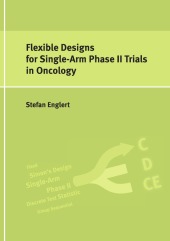 Neuerscheinungen 2014Stand: 2020-02-01 |
Schnellsuche
ISBN/Stichwort/Autor
|
Herderstraße 10
10625 Berlin
Tel.: 030 315 714 16
Fax 030 315 714 14
info@buchspektrum.de |

Stefan Englert
Flexible Designs for Single-Arm Phase II Trials in Oncology
2014. 192 S. 210 mm
Verlag/Jahr: EPUBLI 2014
ISBN: 3-7375-0312-5 (3737503125)
Neue ISBN: 978-3-7375-0312-9 (9783737503129)
Preis und Lieferzeit: Bitte klicken
Flexible Designs for Single-Arm Phase II Trials in Oncology
Clinical phase II trials in oncology are conducted to determine whether the activity of a new anticancer treatment is promising enough to merit further investigation. Two-stage designs are commonly used for this situation to allow for early termination.
Designs proposed in the literature so far have the common drawback that the sample sizes for the two stages have to be specified in the protocol and have to be adhered to strictly during the course of the trial. In this book, we propose flexible methods that allow an arbitrary modification of the sample size of the second stage using the results of the interim analysis or external information while controlling the type I error rate. We derived these new flexible and more efficient phase II designs for both a planned fixed second-stage sample size and for the situation that the planned second-stage sample size depends on the interim outcome. Results are tabulated for a wide range of frequently used design parameters.
The search algorithms used to identify these designs are computationally intensive. Therefore, ways to improve the search strategy were developed and the implementation of these methods is described in detail. All computer programs are provided and illustrated with examples. Emphasis was placed on evaluation of the adaptive performance of the developed flexible phase II designs. When adjustments are made, the consequences in terms of increasing / decreasing the sample size have to be weighed against the gain / loss in power.
We developed a performance indicator that fits to binary outcomes and satisfactorily addresses recalculation possibilities. Thus, we identified recalculation rules which improved the performance of the designs, if there is uncertainty with respect to the treatment effect. Application and the rich possibilities of the proposed methods were illustrated with a clinical trial that was planned with methodology described in this book.
Englert, Stefan
2005 Studium der Mathematik an der Julius-Maximilians-Universität Würzburg, Abschluss: Diplom 2010 Wissenschaftlicher Mitarbeiter am Institut für Medizinische Biometrie und Informatik, Ruprecht-Karls-Universität Heidelberg, Abschluss: Dr. sc. hum.


